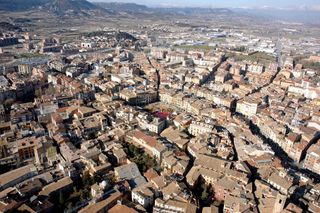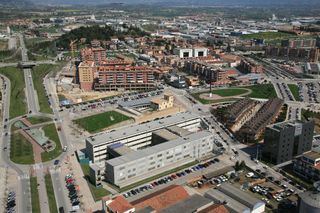Anna Erra Solà (born in Vic in 1965) holds a diploma in Teaching and is a graduate in Geography and History. She has been the Mayor of Vic since 2015, and as such she is the president of the Board of Trustees of the Balmes University Foundation, the institution that owns the University of Vic - Central University of Catalonia. She is also a Member of the Parliament of Catalonia, sitting for the JxC group.
What are your thoughts about the Covid-19 situation that the city and the University are experiencing?
These are really very complex times which are very difficult to understand, which adds even more uncertainty to the uncertainty inherent in the disease itself. Both the city and the University have reacted to the exceptional nature of the circumstances with great integrity, in the midst of the confusion and difficulties that it all entails.
I know that the University has been able to continue academic life as normal to a large extent, as the institution was practically ready to make the transition to working online if necessary, and that is what it has done. In the space of around a week, the students went from attending class to connecting with teaching staff from home without any major problems, and that is quite an achievement if we consider the number of people involved on both sides. That is something that in the middle of our problems, we must be proud of and which must make us feel part of a community that is committed, engaged and willing to overcome the challenges that arise.
And that is what the current situation requires and demands of society as a whole. I know that the conditions cannot be extrapolated (the situation in other companies does not permit them to make a transition like UVic-UCC has), but the attitude and the will are there. The University is a very important part of our society, and its example has instilled us with energy and given us hope. Not only because it work and study have continued normally there, but also because we have seen every day how the university community has contributed to the fight against Covid-19: nursing students and teachers who have volunteered to work in health centres, teaching staff in the Faculty of Medicine who are combining their heavy clinical workload with classes, students and teachers in the area of Education who are working on support for diversity and in senior citizens' residential homes... The institution has also organised numerous humanitarian initiatives to provide materials to hospitals.
I am really impressed with our response to this situation of pain and grief for so many families and uncertainty for everyone, both as a city and as a society, in all areas.

«The University is a very important part of our society, and its example has instilled us with energy and given us hope»
What is the Balmes University Foundation?
Vic City Council, the Balmes University School and Eumo Editorial established the Balmes University Foundation (FUBalmes) on 9 January 1985, as the body which owned the Mestres Balmes University School and Eumo Editorial and coordinated university studies in Vic. It had a Board of Trustees with ten members, and the mayor of Vic - who at that time was Ramon Montanyà - was the president.
These statutes have been amended on several occasions to adapt them to circumstances at various points in time. In 1998, after the University of Vic had been approved by the Parliament of Catalonia, they were amended to enlarge the Board of Trustees to include more representatives of the University and the City Council. One of its first tasks was to approve the University's Organisational and Operational Regulations. They were amended in 2002 to include three representatives of the Government of Catalonia, which provided a stable cource of funding for the UVic and made the Catalan government involved in the University's governance. The Statutes were adapted to the third volume of the Civil Code of Catalonia in January 2010, as a result of which the FUBalmes became a private foundation run as a public body, with a Board of Trustees with 20 members, with representatives of municipal institutions and the Government of Catalonia forming the majority. In 2013 the Board was expanded to 35 members, and the Organisational and Operational Regulations that consolidated the UVic's new governance model were approved.
The Organisational and Operational Regulations have since been updated to adapt to both the new regulations and the University's federative model.
How have the roles been distributed since the federation with the Bages University Foundation in 2014?
The Balmes University Foundation is the body that owns the University of Vic - Central University of Catalonia as a whole, and the Bages University Foundation acts in the same capacity for the university studies taught in Manresa. The FUBalmes and the FUBages renewed the federation agreement on an indefinite basis at a ceremony at the Ministry of Business and Knowledge on 1 March 2019, in order to give the federation greater stability.
The federation agreement creates an unprecedented framework for cooperation and governance within the Catalan university system, which is based on autonomous management and shared responsibility when undertaking projects of mutual interest. It is a structure that generates synergies and complementarities in the range of courses offered, provides momentum for research and knowledge transfer activities, and enhances relationships with the local economic, social and business fabric.
The federation highlights the local sphere's capacity for leadership within the country as a whole, as well as at a university level, and it uses a governance model that has been successful for both parties involved. This model is based on a partnership between private management focused on efficiency in results, a firm dedication to engage in public service, and an active commitment to the development of the local area, in both socio-economic terms such as quality of life, and as regards human development.

«The federation agreement means that UVic-UCC is the leading university in central Catalonia with two large federated campuses, one in Vic and one in Manresa»
What does the federation agreement entail?
The agreement means that UVic-UCC is the leading university in central Catalonia with two large federated campuses - one in Vic and one in Manresa. It is based on four principles: the principle of a federation agreement, in which each of the federated institutions is responsible for the management of its own centres, with their own human, technological and heritage resources, and it establishes a strategic institutional relationship based on partnership and shared responsibility in academic organisation, so that the entire federation makes up a single university located in several cities. The principle of subsidiarity involves the institutions providing each other with support, help and reinforcement, without replacing each other, so that everything that can be done at the local level takes place there and not elsewhere, combining complementarities and synergies. There is the principle of maximum autonomy for the federated institutions in the economic, financial, ownership and academic spheres, according to which each institution prepares and manages its budget independently, determines its own registration fees and enters into collaboration agreements with external institutions, and finally, the principle of cooperation as a federation, whereby the two federated bodies undertake to do their utmost to involve the other institution in new academic, research, knowledge transfer and/or territorial development projects.
«The bachelor's degree course in Medicine is being taught for the third year in the academic 2019-2020 year, and has teaching units in Vic and Manresa for the contents and internships in the clinical cycle»
How is the Foundation for Advanced Health Sciences Studies involved in this federation?
The Foundation for Advanced Health Sciences Studies (FESS) is a non-profit organisation that was established on 16 January 2015 by the Balmes University Foundation and the Bages University Foundation to carry out university studies and research, knowledge transfer and dissemination activities in the Health Sciences field, and within the framework of UVic-UCC. The FUBalmes and the FESS signed a federative contract on 20 December 2016, which covers teaching on the bachelor's degree in Medicine - which is being taught for the third year in the 2019-2020 academic year, and has teaching units in Vic and Manresa for the contents and internships in the clinical cycle. This agreement also stipulates that each of the federated bodies is responsible for managing their own centres with their own human, technological and financial resources. The Foundation is a non-profit organisation, with its own legal personality, and is governed by a board of trustees that can have a maximum of 20 members.

«The study of the overall social value of UVic-UCC on the two campuses, in Vic and Manresa, which analysed and monetised the institution's social value in the 2017-2018 academic year, concluded that its consolidated social value is 9.5 times greater than the grants it received»
What does the University mean for central Catalonia?
The University presented the second report on the institution's economic impact in 2019. That study, which focused on the impact of the university's activities on the Vic campus, valued the amount that the campus contributed to the Catalan economy and the 1,942 jobs created directly and indirectly during the 2017-2018 academic year at 110 million Euros.
Since then, there has been a study of the overall social value of UVic-UCC on the two campuses, in Vic and Manresa, which analysed and monetised the institution's social value in the 2017-2018 academic year, and concluded that its consolidated social value is 9.5 times greater than the grants it received. To be specific, this social value amounted to 64,268,260 Euros, compared to 6,755,910 million Euros received in grants during the academic year studied. And the University's contribution or return to the Administration amounted to more than double the grants it received. So the University is undoubtedly a source of wealth for central Catalonia and the country as a whole.
What form does the campus-city take in Vic?
Although the first facilities were on carrer Miramarges, behind the railway and bus stations, which were then expanded westwards with a new building, the refurbishment of the Masia Torre dels Frares and the RUVic private residence, the University has since expanded across the entire city. First towards the north-west, with the CAFE building in the sports area, then in the centre, with the Casa de Convalescència, where the Rector's office and the FUB offices are located, and then at Can Baumann, to the north-east, where the Faculty of Medicine was established.
This plan, which aims to cover the entire city, is continuing with the City Council and the Balmes University Foundation’s main projects in terms of investments and facilities. One of these is the Beta Technology Centre's move to Can Baumann, to create a scientific-technical campus that fosters a symbiosis between the University and industrial facilities. The project, which will cost two million Euros and will occupy 1,500 square metres, is expected to be completed by the end of 2020. Another project that is also under construction is the RUVIC 2, a second university residence promoted by a private owner in partnership with the University, which will provide 300 places on the carretera de Roda road, very close to the Faculty of Medicine.
Another of the major projects that could open in late 2020 is the University's Auditorium in the old church of the Hospital de la Santa Creu. It will have a capacity for almost 300 people, and will be available for use by both the university and by the city. In the future, we plan to set up the Health and Social Studies Centre in the south, and to build a health complex in the Atlantis area, in the east of the city.
All these investments are always subject to obtaining external funding, as the University's resources are limited, of course.
This means we will have a circle of facilities - which will have been made possible by investments linked to external financing - which is centred on the Rectorate building and the FUB in the city centre, from where it is possible to reach everywhere on foot in 10-15 minutes. That's why we can talk in terms of a campus-city or a city-campus. And the same identification that exists from the point of view of governance between the City Council and the University must also exist between the citizens and the university community. We are convinced that knowledge and research are a city's two most important aspects for the future, and both the City Council and the Balmes University Foundation are doing everything in their power to make the city a genuine pole of attraction in those areas.